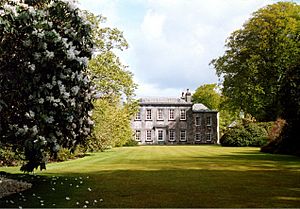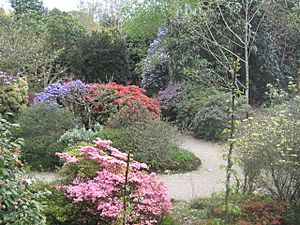Sir Christopher Hawkins, 1st Baronet facts for kids
Sir Christopher Hawkins, 1st Baronet (born May 29, 1758 – died April 6, 1829) was an important figure from Cornwall, England. He owned a lot of land and mines, was a politician for the Tory party, and supported new technologies like steam power. He also served as a judge (called a Recorder) for several towns in Cornwall, including Grampound, Tregony, and St Ives.
Contents
Sir Christopher Hawkins' Family
Christopher Hawkins was the second son of Thomas Hawkins, who owned a lot of land and was also a Member of Parliament (MP) for Grampound. His father, Thomas, was very afraid of smallpox and sadly died after getting a shot to prevent it.
Christopher's older brother, John, drowned in the River Thames while he was studying at Eton. Another younger brother, Thomas, died from a "fever" after eating ice cream. However, his youngest brother, John Hawkins, lived and became a famous geologist who studied rocks and the Earth. When his father died in 1766, Christopher inherited all the family's land and wealth.
A Career in Politics
In 1783, Christopher Hawkins was chosen as the High Sheriff of Cornwall, a high-ranking local official. Then, at age 26, he followed his father's path and became a Member of Parliament.
He became well-known for something called 'boroughmongering'. This meant he bought and sold control over special voting areas called "rotten boroughs". These were places with very few voters, so it was easy to influence who got elected through favors or even by paying people. At his most powerful, Sir Christopher controlled parts or all of six such areas. Each of these areas could elect two MPs. This gave him a lot of power to help people get elected, usually in exchange for money or other benefits. He typically used these seats to support the government's (Tory party) candidates.
Sir Christopher himself was an MP for several of these Cornish areas he controlled:
- Grampound from 1800 to 1807
- Mitchell from 1784 to 1799, and again from 1806 to 1807
- Penryn from 1806 to 1807, and again from 1818 to 1820
- St Ives from 1821 to 1828
He wasn't known for giving many speeches in Parliament. Records show he spoke only four times. Once in 1807, when he faced questions about elections, he simply said he trusted the Parliament to be fair. Twice in 1819, when discussing a bill about elections in Penryn, his words were so quiet that no one could hear him. And again in 1827, he was "totally inaudible."
Becoming a Baronet
For his strong support of the Tory government, Sir Christopher was given the special title of baronet in 1791 by William Pitt the Younger, who was Prime Minister at the time. By the time he died, he had become the Father of the House, which means he was the longest-serving Member of Parliament.
Land and Mine Ownership
Sir Christopher inherited a lot of land from his father. But he worked hard to buy even more land. He once famously said he could "ride from one side of Cornwall to the other without setting hoof on another man's soil." He bought more than a dozen manors (large estates), many of them, like those in Grampound, Mitchell, and St Ives, were bought to gain control of the "rotten boroughs" for political power.
He also bought the manors of Cargoll and Trelundra to help his interests in Mitchell. While trying to improve some unused land in Cargoll by deep-plowing, workers found lead ore. Sir Christopher started the Old Shepherds Mine to dig for lead. They also found silver, which made the mine very profitable before it closed in 1820. In 1818, he opened a copper and tin mine in St Ives, later known as St Ives Consols. At his stream works in Ladock, near Grampound, they found gold as well as tin. Sir Christopher even gave a piece of Ladock gold to the Royal Geological Society of Cornwall and wrote about his findings.
Sir Christopher was also a partner in the Cornish Copper Company. This company built a smelting works (a place to melt metal) at Copperhouse, dug a canal to Hayle, and made the harbor there bigger. This allowed them to export metals and import coal, timber, and other goods. He also owned china clay mines in the St Austell area. He greatly rebuilt the harbor at Pentewan to be a port for china clay, connecting it to St Austell with the Pentewan Railway, which was a horse-drawn tramway.
Sir Christopher also held an important position called Vice Lord Warden of the Stannaries. This gave him a lot of power and control over mines and mining in Cornwall.
Trewithen House and Gardens
The family home, Trewithen House, is near Probus. It was bought in 1715 and then greatly rebuilt to be very grand. Sir Christopher's father inherited the house in 1738 and did a lot of work on the surrounding landscape. Sir Christopher, who was known locally as "Sir Kit," made the gardens even bigger but didn't add much to the house itself. This made some of his local tenants think he was a bit stingy.
A funny poem was supposedly put on the gates of Trewithen:
- A large house, and no cheer,
- A large park, and no deer,
- A large cellar, and no beer,
- Sir Christopher Hawkins lives here.
Today, Trewithen House is a Grade I listed building, meaning it's a very important historical building. It's still owned by a family member and has a painting of Sir Christopher inside. You can even visit it! The dairy farm at Trewithen provides milk for the ice cream made by Kelly's of Cornwall.
The garden at Trewithen was created by G. H. Johnstone. It covers about 23 acres and is famous for its beautiful design and its large collection of camellias, magnolias, and rhododendrons.
Supporting New Ideas
Sir Christopher was a member of several important societies, including the Royal Society, the Royal Horticultural Society (which focuses on plants and gardening), and the Antiquarian Society (which studies old things). He also supported the Royal Institution, a place for scientific research and education.
In 1811, he wrote a short book called Observations on the Tin Trade of the Ancients in Cornwall. In it, he shared his ideas about how the Phoenicians (an ancient people) might have been involved in mining and trading Cornish tin.
Sir Christopher was a big supporter of the Cornish steam engine inventor, Richard Trevithick. In 1812, he asked Trevithick to build the world's first steam-powered threshing machine. This machine, powered by a "semi-portable" engine, helped separate grain from stalks. It was used until the 1880s and is now kept at the Science Museum in London.
In 1813, he brought a special type of apple called the Cornish Gillyflower to the attention of the Royal Horticultural Society. He found this apple growing in a small garden in Truro. The society gave him a silver medal for his efforts. This apple is still grown and sold today!
Sir Christopher never married. When he died, his land and wealth went to his youngest brother, John, and then to his nephew, Christopher Henry Thomas Hawkins.
Sir Christopher in Stories
Sir Christopher Hawkins is a character in the famous Poldark novels by Winston Graham. In these books, he is shown as a clever politician who knows how to use the "rotten borough" system, but he is also kind to his friends.
 | Emma Amos |
 | Edward Mitchell Bannister |
 | Larry D. Alexander |
 | Ernie Barnes |



